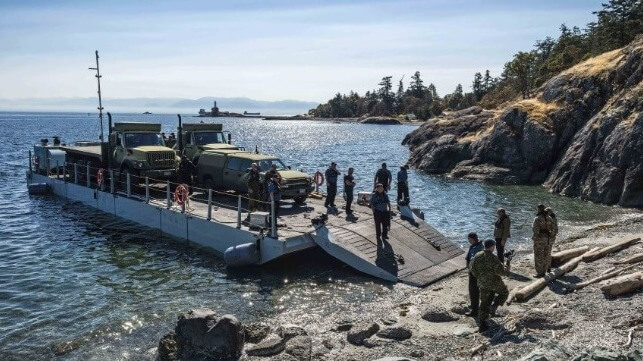Video: Royal Canadian Navy Tests Unique Modular Ship-to-Shore Barge

The Royal Canadian Navy has taken delivery of its first dedicated ship-to-shore connector, a barge-like vessel used to transport equipment and supplies from support ships to unimproved beachheads. Long a part of the inventory for the U.S. Navy and the Royal Navy, these vessels bring a new amphibious capability to the RCN for peacetime and wartime operations.
Built by shipyard Navamar at the Port of Montreal, the modular barges will be the amphibious transport system for the RCN's long-delayed Protecteur class fleet auxiliary, also known as the Joint Support Ship (JSS). This two-ship project is about six years behind schedule and US$1.3 billion over its original budget, and its future is under review - but its first ship-to-shore connector is already delivering goods.
In October, 18 Royal Canadian Navy sailors completed a five-week operational training with instructors from the UK Royal Navy at Esquimalt, British Columbia, testing out the capabilities of the new modular system. The team put the first delivered model through its paces on Esquimalt's rocky shoreline (above).
The barge is designed to be disassembled and stowed in pieces aboard the JSS, much like a set of shipping containers. The propulsion system consists of two engines with outboard drive units, much like oversized outboard motors, and each fits into a shipping container for stowage on the support ship. When the system is needed, it can be unpacked, assembled and deployed.
The barge has a reinforced steel hull and can hold up to 81 tonnes of supplies, vehicles, equipment or personnel. Depending on the needs of the operation, it can also transform into a bridge, a floating dock, a diving platform for salvage or a mobile crane barge.

that matters most
Get the latest maritime news delivered to your inbox daily.
“This will definitely add a unique, versatile capability that we currently don’t have in the fleet,” said Master Sailor (MS) Christopher Cale, one of the RCN sailors assigned to the training.
Until the first Joint Support Ship is commissioned - the latest timeline calls for delivery in 2025 - the RCN's sailors will maintain their skills on the ship-to-shore connector through periodic refresher trainings.
